Thirty-five years ago this year, eight to ten people of faith decided to gather on Monday evenings in a panel apartment on Galopp Street in Kaposztásmegyer (Budapest) for a Bible study. The leader and founder of the small community was Gábor Csere, whose church-building ministry was and is still carried on by the Zámbó couple, András and Hajnalka, with the support of many co-workers. The former home group has now grown into a congregation of several hundred people with a church.
Panelház (panels, or panel apartments) is a Hungarian term referring to a type of concrete apartment building constructed using prefabrication. The prefabrication method allows for a streamlined construction process, enabling developers to construct housing quicker than traditional methods. In the years following WWII, in response to rapid population growth and urbanization, panel apartments using the prefabrication construction method emerged as the primary government response to housing shortages. As the number of individuals moving to these neighborhoods grew, so too did the need for ministry and pastoral care in the community
I STAND MY WATCH...
If you arrive at the Reformed congregation in Káposztásmegyer between 9:15 and 9:30 on a typical Sunday morning, you find yourself in an active servant community. You will find that many congregation members come and go as they go about their current tasks, exchanging a word with one another and sometimes praying, experiencing the fellowship of a brother and sister. The person in charge of worship may be checking the heating, while the people in charge of the services for preschoolers, elementary, and high school children are arranging the rooms for their sessions. The person in charge of document distribution arranges the books, the musicians coordinate and rehearse, and the sound and projection teams work on technical preparations.
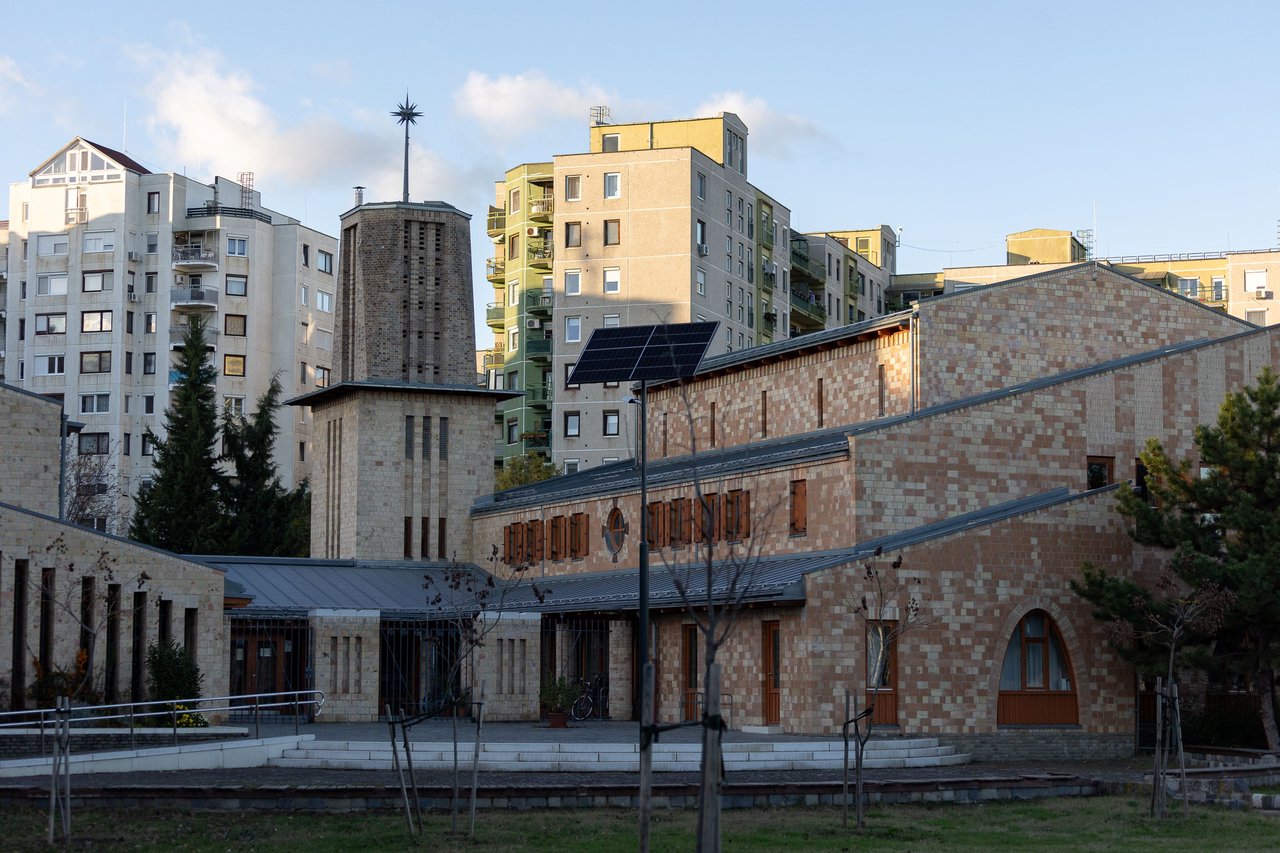
Photo: Zoltán Németh
Meanwhile, the welcoming team is cutting up the liturgy cards provided for the new arrivals. If the congregation is preparing for a communion service, a special team is responsible for the details. Additionally, there is an equally responsible team to ensure that the flowers arrive on time. The end of the month means a prayer service, in which the participating brothers and sisters set up a room to receive prayer requests in a relaxed atmosphere during the more extended block of praise after the sermon. While the hustle and bustle is going on, the pastor appears and becomes part of the community with a word of encouragement, a smile, or a hug. At ten o'clock, the person in charge rings the bells, and the liturgy begins. After the service, there is a similar bustle, only here, the members of the congregation who are not serving at the time join in the conversation and pack up, which often lasts until noon or even longer.
It is fascinating how a simple home group has developed into such an active and joyful community of service, which takes ownership of the events and the church that hosts them. And where, because of this, people who come in can experience what it is like to be part of a healing community.
FROM HOME GROUP TO CONGREGATION
The development of the residential area of Káposztásmegyer, in the northern part of Budapest, started in the early 1980s. By the time the system changed, more than six thousand apartments had been completed. From the middle of the decade, people started moving into the panels, including many looking for a church in addition to their new home. Gábor Csere started the home gorup in the housing estate in 1988, which became the nucleus of the church that later grew into a congregation. The church, which had been growing in the meantime, could employ Gábor Csere as a full-time missionary worker from 1991 after the financial and administrative support had been provided, partly by a Dutch congregation. In the meantime, the group moved from their private homes to the community centre in the housing estate, where they held their first service on Sunday mornings in 1990. Soon after, faith education began to be taught in local schools, and summer camps were organised, first for families and later for children, young people, and the elderly. In time, confirmation training began, as well as the annual evangelisation with invited speakers such as József Zimányi, Miklós Szarka, and Tamás Végh. In addition to the summer camps mentioned above, the ever-growing community was brought together through fellowship and excursions. Over the years, the community, supported by the local Catholic parish, matured into a congregation, so in 1997, they separated from the mother church, and the Reformed Missionary Parish of Káposztásmegyer was born.
CHURCH IN THE PANEL RING
The next milestone after the official church planting was the search for a pastor. “At that time, we had already talked a lot about our future pastor, whom we had sought and invited. We were looking for and found a pastor who was faithful, hard-working, and able to ‘roll with the punches’ and accept local conditions. Not just one, but two at once…” recalls Gábor Csere. András Zámbó and his wife, Hajnalka Zámbó Ivanics, came to the church in September 1997 as pastors and threw themselves into the work.
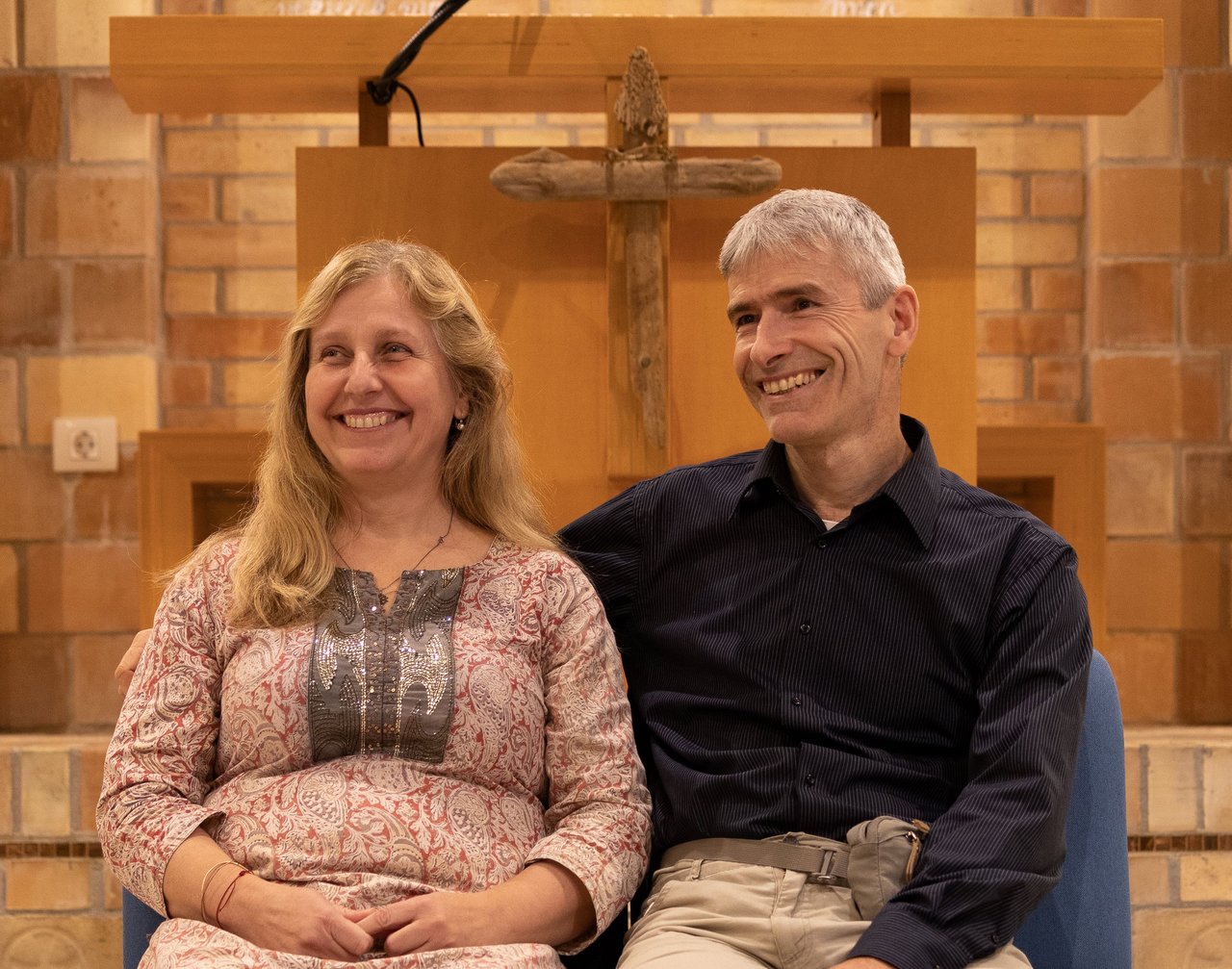
Photo: Zoltán Németh
The pastor and his wife's unstinting enthusiasm was needed, as the time was ripe for the community to move to a church after outgrowing the community centre. At the time, in the beginning of the building process, it seemed an impossible task. András Zámbó, the man involved, says of this period “Money was raised very slowly. It was our trial of faith. We failed right at the beginning: the basement under the great hall was pulled out of the plan because the necessary funds were not raised in time. Of course, when the foundations were laid a year later, the money came in, but by then it was too late. Subsequently, donations were also much slower to come in than we would have liked. Gábor Csere consoled us: a tangible church cannot be built faster than a spiritual one. And he was right. It took ten years from 2001, when the local government donated the land until we could finally consecrate it. In the meantime, there were years when nothing happened, just money was raised. For two years, the church waited for the winter with its roof open. One winter, it snowed so much that we built an igloo in the middle of the church," says András. The project was only really completed in 2019 with the paving of the courtyard. It was a great relief that the material things finally did not distract attention from the spiritual construction - although there are still some minor improvements. Asked what has pushed the leaders through the difficulties and overwhelming responsibilities, the pastor says “Faith. I believed, even knew, that God would make everything ready. I never wavered in that belief. This congregation and this church do not belong to me, but to God. It is not up to me…”
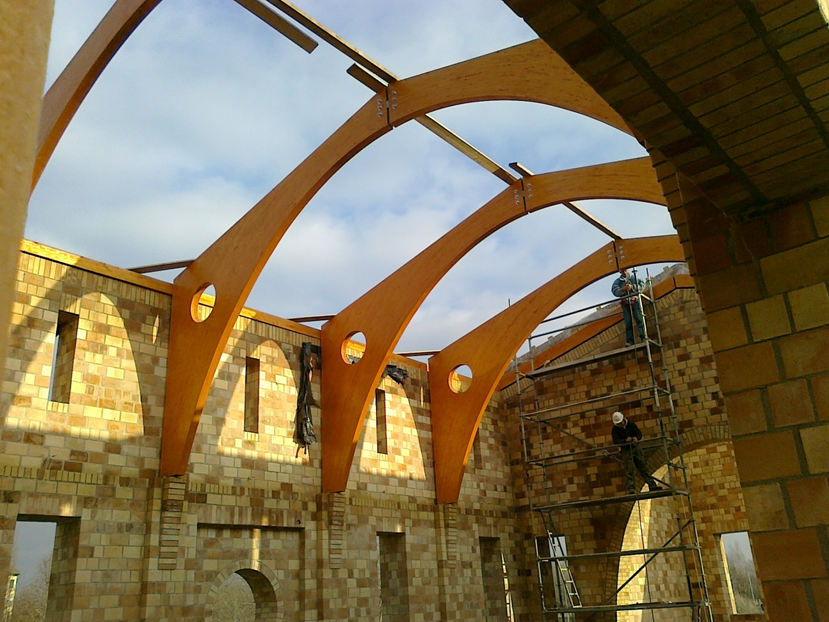
Photo: András Zámbó
"In the autumn of 2011, our congregation was preparing for the consecration of a church. With a lot of physical work, financial sacrifices, and organization, who could contribute what? In the last weeks, before the big celebration, there was still a lot to do. The workers were getting tired. Someone thought of (or rather got) the idea of organising a prayer network around them. People in wheelchairs, people with babies at home, and the sick took on this ministry, and we brought them prayer cards with current topics. Finally, we set up prayer vigils - as we called them - with each servant, i.e. two or three brothers praying for one. Our lead pastor - a strong young man - had a frail sister, well over eighty, praying for him. This aunt didn't have a computer. She was given little handwritten letters to pray for. As a messenger, I remember her standing on the balcony waiting for the next letter to come, so that she could pray." (Éva Sz., church member)
IN A SERVING-HEALING COMMUNITY
We have often heard that the teacher's potential increases during the breaks between two lessons, when he or she can connect more effectively with the students. We can translate this statement to the workings of the congregation in Káposztásmegyer, where between two Sunday services, there is a personal connection between brothers and sisters, a community that is lived out, and there are many opportunities for this to happen from week to week. One of the secrets of these many opportunities is that the congregation is a serving community. Hajnalka puts it this way: “A servant community is truly formed when the leader can rejoice in how much better others can do things than he can. People are empowered, given space, given confidence. It's like the story of Arthur the Dumpling: everyone knows something that others need. It gives them their place, their entitlements in the community.”
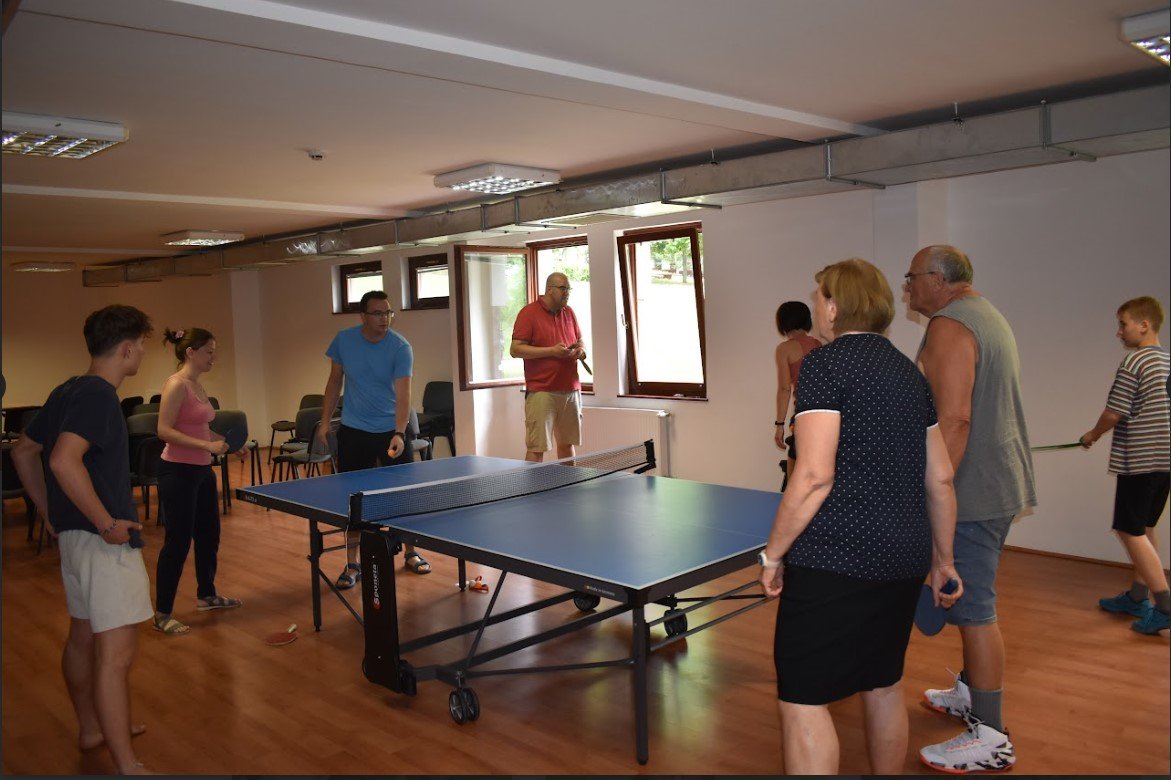
Photo: Sándor Németh
The Apostle Paul's words on the diversity of the gifts of grace and the unity of the church are also evident in practice in Káposztásmegyer. And there is plenty of room for the unfolding and exercise of spiritual gifts, as there is no shortage of programmes. To be complete: baby-mama circle, bible study, periodic marriage classes, and The Art of Marriage, for those who are looking for a course on the Cross, bereavement, and women's circle, and on Friday evenings the church is filled with children's cries, sometimes ending with a late-night game of ping-pong. Confirmation preparation is for both children and adults, with a mentoring system in place for some years.
Those wishing to be confirmed are accompanied on their preparation journey, which lasts several months, by a congregation member who has been a believer for some time. In addition to the image of a servant church, there is also an emphasis on being a healing community. “Healing requires a relaxed atmosphere where we can see that we are in trouble and dare to talk about it. It starts with daring to open up about the problem. The leader also accepts his vulnerability, makes his struggles somewhat transparent, and we try not to burden the others," explains Hajnalka. Healing is served by the prayer service Sundays, when during a longer block of praise, the paired ministers wait for brothers and sisters who want to ask for prayer. The annual weekend of healing presence serves a similar purpose, inviting those who are open to it to several days of retreat and interior work. And there are such people, many of whom wander into the congregation seeking comfort and healing from some wound. There are also opportunities for faith deepening, such as the annual silent day, where a theme is explored with the help of an external speaker through frontal presentations and small group sharing. Likewise, the Immersive, which has been running for a year and a half, seeks to provide spiritual ammunition through the writings of invited members of the congregation that appear on the congregation's website during the week. These devotions unfold a thread and provide helpful questions for spiritual and faith deepening. In addition to fostering personal relationships, the weekly home groups also serve to grow the faith life. The community's network of relationships extends beyond the boundaries. They have sister churches in England, the Netherlands, Denmark, and the Hungarian communities across the border in Transcarpathia and Transylvania. In addition to supporting each other in prayer, these relationships also take the form of visits by small groups and, where necessary, material assistance.
"It is always inspiring for us to meet Christians from other cultures. That's why we have sister churches from many countries and denominations. I was invited to Nepal by an American missionary society (Global Lead). It spoke to me of how fresh Christianity in Nepal is, with new churches springing up, rejoicing in the love and freedom they have found in Jesus. They are organizing youth camps, and we went out to one of these to help with a youth leader and a young couple. Another special feature of this venture was that the male member of the couple was of Nepali origin. For him, this trip was also a chance to meet his roots." (Pastor Hajnalka Zámbóné Ivanics)
THE BACKGROUND TO GROWTH
“An important virtue of our church is non-judgmentalism, the kind of people-centred approach that Jesus had when he took his church to the less-accepted marginalised. We want to be a healing congregation, even if we sometimes, unfortunately, hurt..." Hajnalka stresses, referring to the reason newcomers so quickly feel the community's welcoming attitude.
“Our second Sunday was probably when we got to know the congregation. With no church, they met for worship in the community centre. I came from a traditional community, where on Sundays, the congregation came in ceremonial dress, with great discipline, and in good order. Here, I soon noticed that the brothers and sisters were talking in cheerful groups before the start. Then two young boys came in at once. Wearing slippers and plaid shorts, they sat down on a table pushed up against the wall. I was shocked: what is this?! This is a church! Perhaps a good year had passed when, on a church outing, one of the boys in the plaid shorts walked up to me. We were talking, and he said, ‘Do you know why I stayed here? In this community? "Because I was accepted the way I am,"’” says one of the church members, sharing his first experience of inclusion. In addition to non-judgement, an important virtue is that members are quick to take on a ministry. And there are plenty of opportunities since the many programmes provide the opportunity for deepening relationships and building community. The third important feature is that in Káposztásmegyer, there is teamwork.
“We do a lot of things this way, and I think these things work well. It's the way the presbytery works, the way the staff works. If we had to present our business card, it would be a team photo," says Hajnalka. An attitude of inclusion and acceptance, non-judgment, a willingness to serve, and the importance of personal relationships are all characteristics of the community that add to its healing power. The biggest community event is the summer church camp, which this year attracted more than two hundred and fifty people in Balatonszárszó.
CHALLENGES AND HERITAGE
In a little over thirty years, the congregation of Kaposztásmegyer has grown from a few members in a house group to a church with a missionary congregation of several hundred. This journey, which has brought many opportunities, joys, and of course, challenges, has also highlighted areas where progress is still needed and where particular attention needs to be paid. It is a dynamic church with a busy calendar of events, so organisation and communication must be constantly improved. In the latter context, András and Hajnalka think it is important to pass on and communicate what has worked well in their experiences, such as the planting of young people or the reform of the confirmation process. It is a model that young people are also serving as youth leaders in the children's groups, who are also taking part in related coaching and training. As for the plans, missionary work is always a priority. And one of the most important vehicles for this is the children's work in the church. Mission work is intensively carried out in church services, Sunday children's and youth groups, and many summer and winter camps, as many parents have already been able to reach the church through young people.
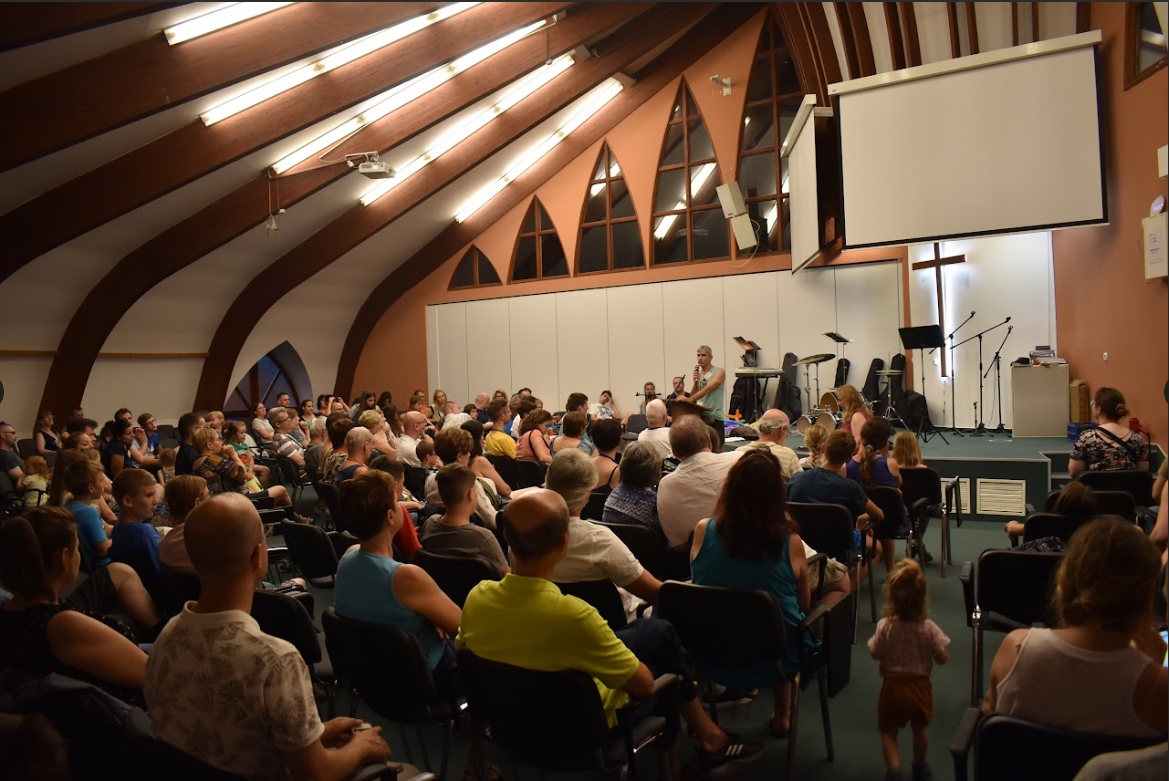
Photo: Zoltán Németh
A characteristic feature of the Sunday sermons since the days of the founder, Gábor Csere, has been that they usually avoid the language of Canaan, instead using plain language that brings the Word close to the laity and gives them everyday guidance. This principle has always been, and still is, important to the Zambós. As a result, many parents who come to an occasion - usually a celebration at first - through their child get stuck here. Many of them have become active members of the community. And what is the legacy to pass on? “Faithfulness to Jesus, because this is the source of openness, freedom, family, naturalness and joy," the pastoral couple answer together. The mission is clear for future generations because the vine growing on the vine can bear fruit.